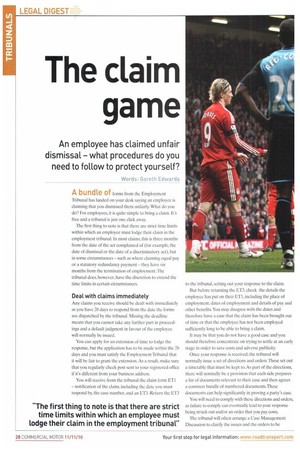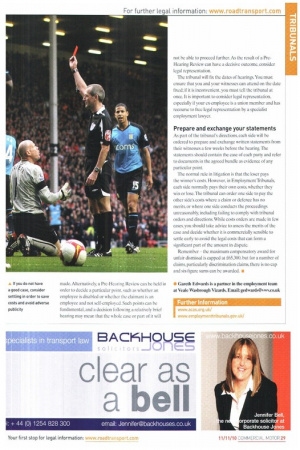The daim game
Page 28

Page 29

If you've noticed an error in this article please click here to report it so we can fix it.
An employee has claimed unfair dismissal what procedures do you need to follow to protect yourself?
Words; Gareth Edwards
A bundle of forms from the Employment Tribunal has landed on your desk saying an employee is claiming that you dismissed them unfairly. What do you do? For employees, it is quite simple to bring a claim. It's free and a tribunal is just one click away.
The first thing to note is that there are strict time limits within which an employee must lodge their claim in the employment tribunal. In most claims, this is three months from the date of the act complained of (for example, the date of dismissal or the date of a discriminatory act), but in some circumstances — such as where claiming equal pay or a statutory redundancy payment — they have six months from the termination of employment. The tribunal does, however, have the discretion to extend the time limits in certain circumstances.
Deal with claims immediately
Any claims you receive should he dealt with immediately as you have 28 days to respond from the date the forms are dispatched by the tribunal. Missing the deadline means that you cannot take any further part in proceedings and a default judgment in favour of the employee will normally be issued.
You can apply for an extension of time to lodge the response, but the application has to be made within the 28 days and you must satisfy the Employment Tribunal that it will be fair to grant the extension. As a result, make sure that you regularly check post sent to your registered office if it's different from your business address.
You will receive from the tribunal the claim form ET1 — notification of the claim, including the date you must respond by, the case number, and an ET3. Return the ET3 to the tribunal, setting out your response to the claim.
But before returning the ET3, check the details the employee has put on their Ell, including the place of employment, dates of employment and details of pay and other benefits. You may disagree with the dates and therefore have a case that the claim has been brought out of time or that the employee has not been employed sufficiently long to be able to bring a claim.
It may be that you do not have a good case and you should therefore concentrate on trying to settle at an early stage in order to save costs and adverse publicity.
Once your response is received, the tribunal will normally issue a set of directions and orders. These set out a timetable that must be kept to, As part of the directions, there will normally be a provision that each side prepares a list of documents relevant to their case and then agrees a common bundle of numbered documents. These documents can help significantly in proving a party's case.
You will need to comply with these directions and orders, as failure to comply can eventually lead to your response being struck out and/or an order that you pay costs.
The tribunal will often arrange a Case Management Discussion to clarify the issues and the orders to be made. Alternatively, a Pre-Hearing Review can be held in order to decide a particular point, such as whether an employee is disabled or whether the claimant is an employee and not self-employed. Such points can he fundamental, and a decision following a relatively brief hearing may mean that the whole case or part of it will not be able to proceed further. As the result of a Pre Hearing Review can have a decisive outcome, consider legal representation.
The tribunal will fix the dates of hearings. You must ensure that you and your witnesses can attend on the date fixed; if it is inconvenient, you must tell the tribunal at once. It is important to consider legal representation, especially if your ex-employee is a union member and has recourse to free legal representation by a specialist employment lawyer.
Prepare and exchange your statements As part of the tribunal's directions, each side will be ordered to prepare and exchange written statements from their witnesses a few weeks before the hearing. The statements should contain the case of each party and refer to documents in the agreed bundle as evidence of any particular point.
The normal rule in litigation is that the loser pays the winner's costs. However, in Employment Tribunals, each side normally pays their own costs, whether they win or lose. The tribunal can order one side to pay the other side's costs where a claim or defence has no merits, or where one side conducts the proceedings unreasonably, including failing to comply with tribunal orders and directions. While costs orders are made in few cases, you should take advice to assess the merits of the case and decide whether it is commercially sensible to settle early to avoid the legal costs that can form a significant part of the amount in dispute.
Remember — the maximum compensatory award for unfair dismissal is capped at £65,300, but for a number of claims, particularly discrimination claims, there is no cap and six-figure sums can be awarded.
• Gareth Edwards is a partner in the employment team at Veale Washrough Vizards. Email: gedwards@vwv.co.uk




























































































































